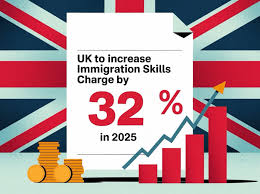UK Cuts Post-Study Work Visa to 18 Months

The UK Government has announced that the Graduate visa (the post-study work route) for most international students will be shortened from two years to 18 months, effective 1 January 2027.
The Immigration Skills Charge (ISC) employers pay when they sponsor overseas skilled workers will rise by about 32%, with the increase taking effect for applications on or after 16 December 2025 (subject to final parliamentary procedures). The government is introducing higher English language standards for migrants and raising some related requirements; separate guidance notes give precise dates for different visa routes. The UK tuition-fee cap for undergraduates was increased by 3.1% for 2025/26 (e.g., from £9,250 to roughly £9,535 for some providers), and the government is considering further measures (such as levies) that may affect international student costs indirectly.

The government is doing this because
The Home Office framed the changes as part of a broader immigration reform package (the White Paper / “Plan for Change”) intended to:
1. Tighten migration controls while still “attracting top global talent”,
2. Ensure international graduates transition into graduate-level employment more quickly, and
3. Reinvest employer charges (ISC) into domestic skills and training to reduce reliance on overseas recruitment.
The government cited data suggesting that a sizable share of Graduate-visa holders did not move into graduate-level roles during the existing two-year window, prompting the reduction to 18 months.
What are the practical implications: For Nigerian (and other international) students
This means, less time to convert study into work because with 18 months you will have a smaller window to secure a graduate-level job or a sponsored Skilled Worker role. That increases pressure to plan early (networking, internships, career services).
Plan for PhD vs non-PhD routes, PhD graduates often have different, longer rights and this 18-month reduction applies mainly to most non-PhD Graduate visas. Check your programme’s classification.
Costlier path for transition, employers may be less willing to convert graduates if the ISC increase pushes up their sponsorship costs (see employers section). This can make it harder for some graduates to get offers leading to sponsorship.
English requirements matter more, you may need higher certified English levels (A-level standard or CEFR B2 in some routes) to be eligible for work/settlement pathways. Prepare and re-test where necessary.
Higher tuition and possible levies, the cost of studying in the UK has already increased in 2025/26, the proposals to levy international fees could further push up costs for future intake. So, budget accordingly.

For Nigerian students already in the UK (or arriving before Jan 2027)
Start job-search early, engage with campus careers services, apply for internships, and target employers that have sponsor licences. Use the 18-month window strategically.
Document readiness, make sure to have transcripts, references, and any required English certificates ready; prepare to evidence “graduate-level” roles if applying to switch into Skilled Worker.
For Nigerian parents and guardians, expect higher costs such as tuition increases plus possible pass-through of any levies could raise study budgets. Reassess savings plans for 2026/27 onward.
For employers (UK and Nigerian companies with UK branches), sponsoring staff will cost more with ISC increase (32%) raises the annual bill per sponsored worker, making entry-level sponsorship costlier and possibly changing recruitment decisions. Expect to see employers tighten sponsorship criteria or raise salaries to meet thresholds. This also entails that shorter Graduate visa may alter hiring timelines given that employers that previously took 12–18 months to evaluate graduates may now need to speed up conversion or offer clear sponsorship pathways earlier.
For universities (UK and Nigerian recruitment partners), recruitment may fall, and sector bodies warned that shorter stay periods and higher costs may make the UK less attractive vs. alternatives (Canada, Australia, EU countries). Hence, we expect universities to revisit admissions strategy and career support. Compliance pressures needs to be taken seriously as the White Paper proposes tougher sponsor compliance rules; universities must bolster compliance teams or face licence risk.

Bigger picture and political context
These measures are part of the UK government’s “Plan for Change” approach balancing public calls for tighter borders with economic needs for skilled labour. The stated aim is to incentivise employers to invest more in UK training (via higher ISC receipts) while making the post-study route more clearly tied to immediate graduate employment. Critics—especially universities and sector groups—warn the changes risk reducing international student numbers and harming higher-education funding models that rely on overseas fees.
What students should do (action checklist)
1. If you’re applying now: consider arrival before Jan 2027 if your plan requires the older two-year window and if that is possible/prudent. Confirm exact rules for your programme.
2. If you’re already studying in the UK: start job hunting early (internships, placements), secure sponsor-ready employers, and document graduate-level responsibilities.
3. Prep your English: check which English tests/certificates you need and ensure you meet the new thresholds.
4. Budget for higher fees: tuition increases and proposed levies may be passed to students—factor that into your finances.
5. Seek university support: use career services and international student offices to map sponsor-routes and to get employer introductions.
The UK’s 2025–2027 immigration changes represent a genuine policy shift: a shorter horizon for graduates to turn studies into work, higher employer costs to sponsor foreign labour, and tighter language and compliance rules. For Nigerian students (and their families), the changes mean plan earlier, prepare better, and budget higher. For employers and universities, it means rethink recruitment, speed up sponsorship decisions, and redouble compliance.
Recommended Articles
Labour Leader Starmer Ignites Furor, Branding Reform Party 'Racist'

Labour leader Keir Starmer has sharply condemned Reform UK's policy to end indefinite leave to remain, labeling it as bo...
Trump's Explosive UN Appearance: Blasts Europe, Warns Putin, and Shakes Global Leadership

US President Donald Trump delivered a contentious speech at the UN General Assembly, criticizing immigration, climate po...
Far-Right Fury Grips London: Tommy Robinson March Sparks Violence, Elon Musk Calls for Parliament Dissolution

A large far-right rally in central London, organized by Tommy Robinson, saw Elon Musk call for a change in UK government...
You may also like...
Bamidele Yusuf's Europa League Fury: Ferencváros Stuns Salzburg 3-2!

Nigerian forward Bamidele Yusuf was the hero for Ferencváros, scoring the decisive goal in a thrilling 3-2 comeback vict...
Kwara United Unveil Suleiman as New Technical Visionary

Kwara United confirm Ashifat Suleiman as their new technical adviser after a steady interim spell, as the Ilorin-based c...
M. Night Shyamalan's Unexpected Romance Dominates Box Office

The romantic thriller "Remain," co-written by Nicholas Sparks and M. Night Shyamalan, is generating significant buzz fol...
Writers Warn of Cataclysmic Fallout from Warner Bros. Merger

The Writers Guild of America (WGA) has strongly denounced any potential merger involving Warner Bros., calling such cons...
Latin Music Icons Crowned: Unforgettable 2025 Billboard Awards Gala

The 2025 Billboard Latin Music Awards celebrated Latin music's finest, with Bad Bunny named Top Latin Artist of the 21st...
Zimbabwe's Economic Spotlight: Real Estate's Lowest Wage Revealed at $305

Employees in Zimbabwe's Real Estate, Distribution, and Clearing sub-sectors will see a significant pay rise, with the lo...
Intel's Grand Comeback: Foundry Business Takes Center Stage Amid Recovery

Intel reported strong third-quarter earnings, exceeding expectations with a $4.1 billion net income driven by increased ...
SA Firm Forges Ahead to Launch Africa's Groundbreaking Listed Bitcoin Treasury Company!

Africa Bitcoin Corporation, formerly Altvest Capital, is raising $210 million to establish Africa's first listed Bitcoin...
